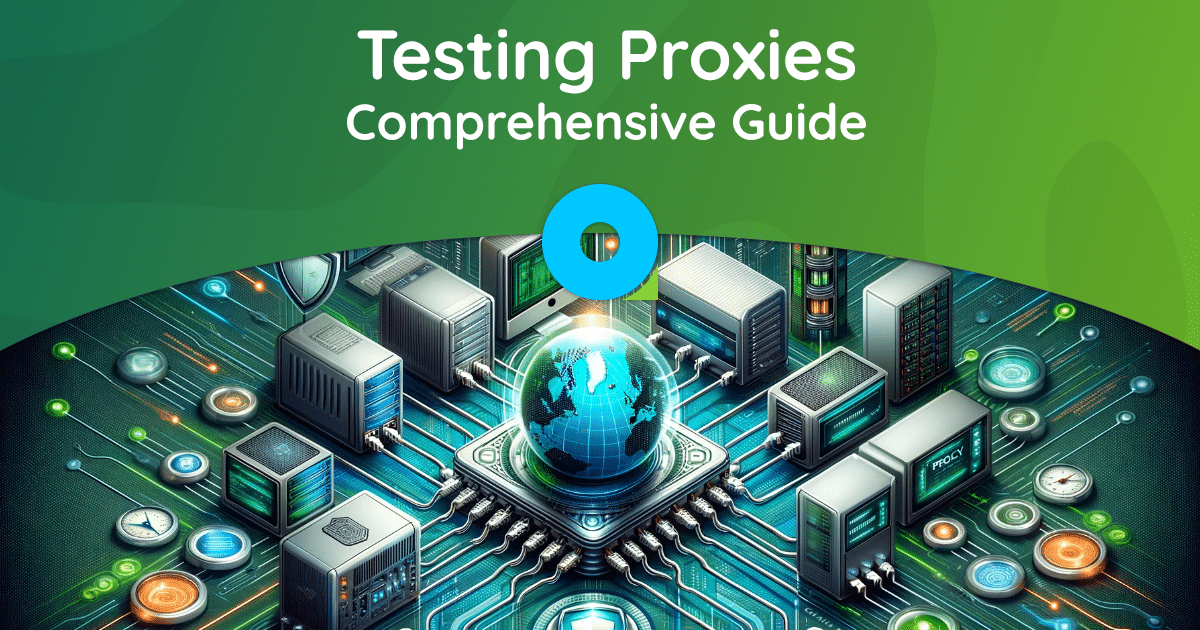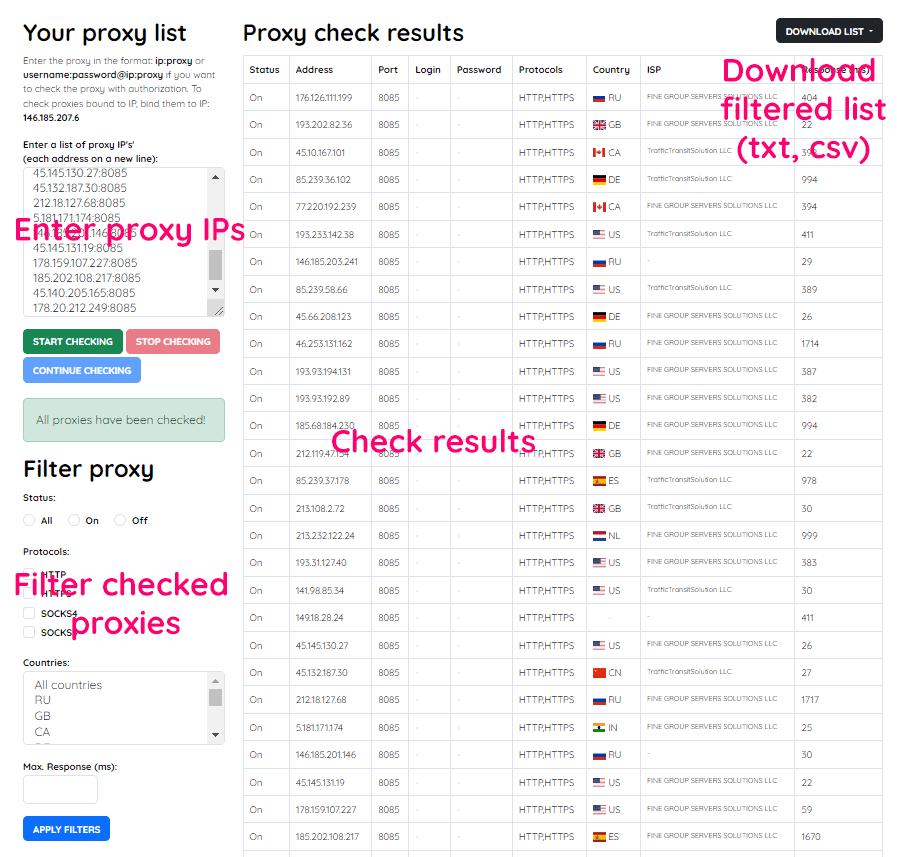
The Importance of Proxy Servers in Internet Security
Proxy servers serve as essential intermediaries between users and the web, enhancing internet privacy and security. They are pivotal in ensuring seamless and secure browsing experiences. A proxy server safeguards your device from direct exposure to the internet by obscuring your IP address, which elevates your online anonymity.
To integrate proxy servers effectively into your digital ecosystem, assessing their performance is a critical step.
Understanding the Need to Test Proxies
Why Test Proxies?
Testing proxies is a vital practice for those utilizing proxy servers. These servers are designed to relay requests and responses, primarily focusing on bolstering online privacy and security. Their key function is to conceal your IP address, thereby hiding your identity and geographical location.
Reasons for Testing Proxies:
- Reliability and Performance: Assessing the reliability and performance of proxy servers is crucial. The speed of a proxy server significantly influences your browsing experience. Regular speed tests are essential to identify the most efficient proxies tailored to your specific needs, such as high-performance requirements for gaming or video editing.
- Anonymity and IP Concealment: Verifying the proxy location is essential to maintain anonymity. The traffic should be routed through a location different from your physical one to prevent the disclosure of your real IP address.
- Regular Monitoring: For those managing multiple proxies, it’s important to regularly test them to monitor performance and identify potential issues. This proactive approach ensures uninterrupted service and protection.
- Trustworthiness Assessment: Proxy testing also serves as a means to evaluate the reliability of your proxy providers.
- Compatibility Check: Ensuring that your chosen proxy is compatible with your frequently used apps and websites is another crucial aspect of proxy testing.
How to Test Proxies
Key Aspects of Proxy Testing:
- Speed Testing: Conducting speed tests to determine the fastest and most efficient proxies for your specific requirements.
- IP Address Concealment: Utilizing proxy checkers or testers to ensure that the proxy server’s IP address is functioning correctly, thus replacing your IP address with the proxy’s during browsing.
- Geolocation Verification: Ensuring that the proxy server routes traffic through a different location than your actual one to maintain your anonymity.
- Compatibility Testing: Checking whether the proxy servers are compatible with the specific applications and websites you intend to use.
Proxy Checkers and Geolocation Services
Proxy checkers and geolocation services play a pivotal role in the testing process. These tools help in verifying the effectiveness of IP address concealment and assessing the geographic routing accuracy of the proxy servers. They are instrumental in confirming that the proxy IP address effectively replaces your own during internet activities.
Testing proxies is a fundamental step in ensuring a secure and efficient online experience. It involves a thorough assessment of speed, anonymity, compatibility, and reliability. Regular testing not only enhances your internet security but also ensures that your chosen proxies align perfectly with your specific needs and applications.
Manual Testing: Detailed Steps for Evaluating Proxy Server Performance
In scenarios where automatic tools are unavailable, or for a more hands-on understanding of proxy server performance, manual testing is a viable option. This approach involves a series of steps to assess various aspects of proxy performance.
Step 1: Understanding Proxy Types
Begin by identifying the type of proxy you are using. Residential proxies and datacenter proxies exhibit distinct performance characteristics. Understanding the differences is crucial in evaluating their suitability for your needs.
Step 2: Acquiring Multiple Proxies
Source a variety of proxies from reputable providers. This diversity enables a comprehensive assessment across a spectrum of performance parameters, ensuring you identify the proxy that best aligns with your requirements.
Step 3: Identifying Proxy IP Addresses
Locate the proxy IP addresses. This can be done through IP checker websites or via PC settings (e.g., navigating to the Control Panel’s internet options and checking LAN settings for IP addresses and port numbers).
Step 4: Verifying Proxy Location
Cross-reference the proxy’s IP address with IP databases to confirm that the location aligns with your needs. This step is essential for maintaining anonymity and effectively bypassing geo-restrictions.
Step 5: Checking Proxy Speed
Manually test the speed by visiting websites and downloading files through the proxy. Comparing this speed with your direct internet connection will give insights into the proxy’s efficiency.
Step 6: Evaluating Anonymity
Use IP checkers while connected to the proxy to verify that your actual IP address is concealed and replaced with the proxy’s IP.
Step 7: Examining Proxy Type and Compatibility
Determine the specific type of proxy (e.g., HTTP, SOCKS) and test its compatibility with your frequently used apps and sites. This includes accessing blocked or geo-restricted content through the proxy.
Step 8: Regular Monitoring
Consistently monitor the performance of the proxy over time. Keeping a log of disconnections or downtime can be helpful in assessing reliability.
Step 9: Assessing Security Features
Review the security features of your proxy, such as encryption protocols, to ensure that your sensitive data remains secure.
It’s important to repeat these steps for each proxy you’re considering. This comprehensive approach allows you to accurately determine which proxy best suits your specific needs and ensures a secure, efficient online experience.
Automated Testing: Advanced Methods for Proxy Performance Analysis
Automated testing of proxy servers offers a significant advantage over manual methods in terms of efficiency and accuracy. Leveraging technology for proxy evaluation ensures comprehensive testing across various parameters. Here’s an insight into the automated testing process:

Key Components of Automated Proxy Testing
1. Speed Tests
- Tool Usage: Utilizing tools like the Fogldn proxy tester provides an efficient means to assess the speed of different proxies.
- Benefits: These tools enable users to identify proxies with optimal response times, enhancing data retrieval speed and overall online experience.
2. IP Address Checks
- Functionality: Automated IP checkers are crucial for verifying if a proxy server effectively masks your actual IP address.
- Process: These checkers cross-reference the proxy’s IP address with IP databases to confirm location and authenticity.
- Advantages: This step is key to ensuring improved anonymity and privacy.
3. Proxy Type Verification
- Tools Example: Automated tools like the OneProxy Checker rapidly identify the type of proxy being used.
- Importance: Understanding the proxy type is critical for ensuring compatibility with different applications and use cases.
4. Bulk Testing of Proxies
- Suitability: Automated testing is particularly beneficial for those managing multiple proxies.
- Capability: These tools can conduct tests on multiple proxies simultaneously, streamlining the process of monitoring performance and security across your entire proxy network.
5. Proxy Verifiers
- Function: Proxy verifiers offer a deeper analysis of proxy performance, assessing aspects such as location, response time, and anonymity level.
- Comprehensive Analysis: These tools provide a more detailed evaluation of the proxy’s capabilities and limitations.
Advantages of Automated Testing
- Time Efficiency: Automated testing significantly reduces the time required for comprehensive evaluation compared to manual methods.
- Enhanced Accuracy: The precision of automated tools in measuring performance metrics like speed, IP concealment, and response time is superior.
- Scalability: Automated testing is scalable, making it suitable for evaluating a large number of proxies efficiently.
- Comprehensive Assessment: These methods offer a more thorough and detailed analysis of proxy performance, covering a wider range of parameters.
Automated testing of proxy servers is an indispensable tool in the digital age, providing a time-efficient and accurate method for evaluating the performance of proxies. This approach is particularly beneficial for businesses and individuals who require reliable and efficient proxy solutions for their varied online activities.
Key Metrics for Proxy Testing
1. Latency: Speed and Responsiveness Assessment
Definition and Importance
- Latency, also known as response time, is a critical performance indicator in proxy testing. It measures the duration a proxy takes to respond to a request.
- Relevance: A proxy with low latency ensures faster response times, leading to quicker data transfer and a smoother browsing experience.
Measurement Techniques
- Method: Latency is measured by sending multiple requests to the proxy server and recording the response times.
- Comparison: Conducting these tests across a range of proxies allows for a comparative analysis of their speeds, enabling the selection of the most efficient proxy.
Applications
- Usage: Low-latency proxies are particularly beneficial for applications requiring real-time communication, such as video conferencing and live streaming.
2. Reliability: Uptime and Connection Stability Evaluation
Definition and Significance
- Reliability refers to the consistency of a proxy’s uptime and the stability of its connection.
- Impact: A reliable proxy ensures uninterrupted access, crucial for bypassing geo-restrictions and enhancing online security.
Testing Methods
- Tools: Proxy testers monitor uptime and connectivity by sending regular requests and recording any downtime or connectivity issues.
- Insights: This data provides a comprehensive view of the proxy’s performance stability over time.
3. Anonymity: Proxy Anonymity Levels and IP Security
Definition and Relevance
- Anonymity in proxy usage is vital for maintaining online privacy and security.
- Function: A proxy should effectively mask the user’s actual IP address with its own, ensuring user anonymity.
Assessment Process
- Testing: Proxy testers evaluate whether the proxy conceals IP addresses effectively.
- Verification: An IP database is used to cross-reference the proxy’s IP for authenticity and location accuracy.
Purpose
- Objective: This process ensures that the proxy server’s location is consistent with its intended purpose, providing a reliable measure of online anonymity.
Conclusion: The Essential Proxy Testing Tool
For a comprehensive and effective proxy testing experience, a specialized tool is recommended. One such tool is the OneProxy Checker, designed to evaluate these key metrics efficiently and accurately. This tool stands out for its ability to provide a thorough analysis of latency, reliability, and anonymity, making it an indispensable resource for anyone seeking to optimize their proxy server setup.





